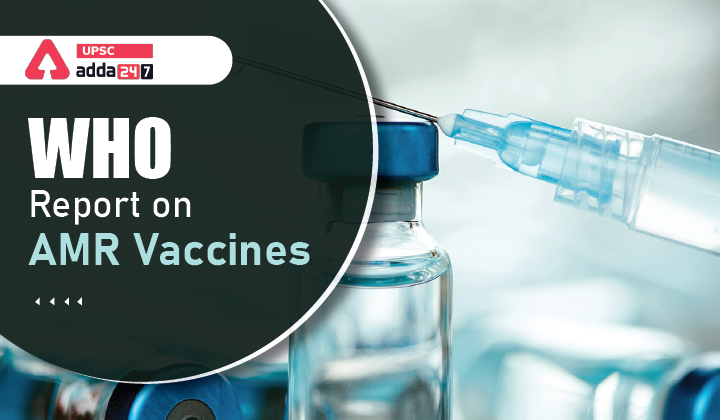Table of Contents
AMR in India: Relevance
- GS 2: Issues relating to development and management of Social Sector/Services relating to Health, Education, Human Resources.
Anti Microbial Resistance in India: Context
- In a first ever report on vaccines for Anti-Microbial Resistance (AMR), WHO has stressed the need to accelerate trials for antimicrobial resistance-related vaccines.
WHO vaccine for AMR: Key points
- Infections due to resistant bacteria are associated with nearly 4.95 million deaths per year, with 1.27 million deaths directly attributed to AMR.
- AMR, however, is about more than just bacterial infections. The resistance occurs when bacteria, viruses, fungi, and parasites change over time and no longer respond to medicines.
- It is often difficult to treat because the infection becomes resistant to antimicrobial medicines.
AMR vaccines: Significance
- Vaccines are powerful tools to prevent infections in the first place and therefore have the potential to curb the spread of AMR infections.
- Of the top six bacterial pathogens responsible for deaths due to AMR, only one—Pneumococcal disease (Streptococcus pneumoniae) — has a vaccine.
Key findings of the report
- The report identifies 61 vaccine candidates in various stages of clinical development to address diseases listed on the bacterial-priority pathogens list.
- The report has also cautioned about these late-stage vaccine candidates as they will not be available anytime soon despite having high-development feasibility.
- The report calls for equitable and global access to the already existing vaccines, especially among populations that need them most in limited-resource settings.
- Vaccines against these pathogens are unlikely to be available in the short term, and alternative interventions should be pursued urgently to prevent resistant infections due to priority bacterial pathogen.
Issues in vaccine development
- Issues include the difficulty in defining target populations among all admitted hospital patients, the cost and complexity of vaccine efficacy trials, and the lack of regulatory or policy precedent for vaccines against infections.
- Vaccine development is expensive, and scientifically challenging, often with high failure rates, and for successful candidates complex regulatory and manufacturing requirements require further time.
What is Antimicrobial Resistance?
- Antimicrobial Resistance meaning: Antimicrobial resistance (AMR) is the ability of microorganisms to persist or grow in the presence of drugs designed to inhibit or kill them.
- These drugs, called antimicrobials, are used to treat infectious diseases caused by microorganisms such as bacteria, fungi, viruses and protozoan parasites.
- Antimicrobial resistance (AMR) is a major global threat of increasing concern to human and animal health. It also has implications for food safety, food security and the economic wellbeing of millions of farming households.
Reasons of AMR Spread
- Antibiotics consumption by humans: Unnecessary use of antibiotics fixed dose combinations could lead to increased resistance in human beings. Issues like self-medication, not having proper knowledge of when to use antibiotics also contributes significantly to the cause.
- Social cause: Incidents like mass bathing in a river, unhygienic practices followed by travellers could also lead to antimicrobial resistance.
- Use in poultry: Antibiotics are used for growth of poultry industry. It further increases AMR in human beings.
- Pharmaceutical industry pollution: The wastewater effluents from the antibiotic manufacturing units contain antibiotics, leading to contamination of rivers and lakes.
- Untreated waste: Untreated disposal of sewage water bodies leads to contamination of rivers with antibiotic residues and antibiotic-resistant organisms.
Read current affairs for UPSC





 TSPSC Group 1 Question Paper 2024, Downl...
TSPSC Group 1 Question Paper 2024, Downl...
 TSPSC Group 1 Answer key 2024 Out, Downl...
TSPSC Group 1 Answer key 2024 Out, Downl...
 UPSC Prelims 2024 Question Paper, Downlo...
UPSC Prelims 2024 Question Paper, Downlo...





